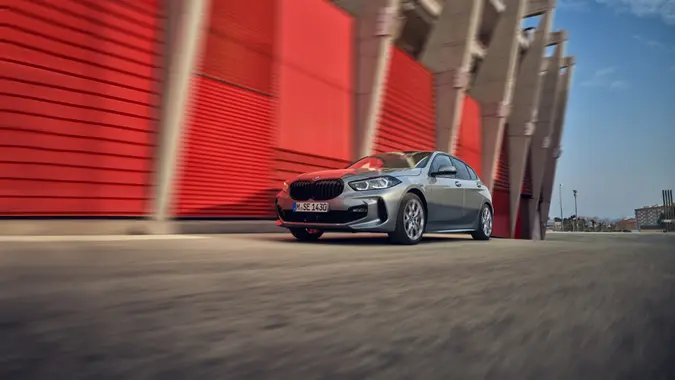Dealer Financing: How It Works and What You Need To Know

Commitment to Our Readers
GOBankingRates' editorial team is committed to bringing you unbiased reviews and information. We use data-driven methodologies to evaluate financial products and services - our reviews and ratings are not influenced by advertisers. You can read more about our editorial guidelines and our products and services review methodology.

20 Years
Helping You Live Richer

Reviewed
by Experts

Trusted by
Millions of Readers
When you’re buying a new car, you want the convenience of driving it home the same day you test drive it. In most cases, the easiest way to do this is through dealer financing. But while most dealers tout their financing as the best way to finance your new vehicle — it can come with hidden costs and end up costing you more in the long run.
What Is Dealer Financing?
Dealer financing is automotive financing directly through a car manufacturer or dealership that is underwritten and fulfilled by a third-party lender. In other words — the dealer acts as a middleman between you and a partner bank, which may end up costing you more.
Here are some key points:
- Dealers have an arrangement with partner lenders to offer financing for the vehicles they sell.
- Dealers can package your loan terms in a way that is favorable to the dealership.
- This package usually includes fees and interest rate markups that cost more money than financing through a bank or credit union directly.
- Dealerships profit from the financing arrangement in exchange for a more convenient transaction for you.
- You can apply for the auto loan for your chosen car without leaving the dealership, and drive off in your new car the same day.
Pros and Cons of Dealer Financing
Pros
- Convenience: Handle both the car purchase and loan in one visit to the dealership.
- Promotional offers: Take advantage of manufacturer incentives like 0% APR or cash-back deals.
- Same-day: May be able to finance the car and take it home the same business day.
Cons
- Potential for higher rates: Dealers may increase the loan’s interest rate to boost their profit.
- Pressure to purchase add-ons: Financing through a dealer might include optional extras that raise your total loan amount.
Dealer Financing vs. Bank Loans
While dealer financing is convenient, it may be more expensive than getting a loan through your local bank or credit union. Here are a few differences between dealer financing and getting an auto loan from a bank:
- Approval process: Dealerships often work with lenders who are more lenient about credit scores.
- Interest rates: Traditional lenders typically offer lower, more straightforward rates.
- Negotiation: Getting pre-approved from a bank allows you to keep the vehicle price and loan terms separate.
- Speed: It may take longer to be approved for a bank loan to purchase the car, while a dealership may allow you to drive away same-day
- Fees: Banks and credit unions usually list fees up front, while dealers may try to hide fees and additional charges in your contract.
Key Differences Between Dealer Financing and Bank Loans
| Feature | Dealer Financing | Bank Loan Financing |
|---|---|---|
| Approval Process | Often quicker, with more flexible standards for credit. | Typically involves a detailed credit review and may take longer. |
| Interest Rates | May be higher, especially if the dealer marks up the rate. | Generally lower and more transparent. |
| Promotional Offers | May include limited-time manufacturer deals like 0% APR. | No access to special manufacturer incentives. |
| Loan Terms | Could include extra add-ons that raise the total loan cost. | Strictly covers the cost of the car without bundled extras. |
| Negotiation | Dealers might tweak the financing, but it could come with extra charges. | Offers a clear separation between car pricing and loan details. |
Things To Consider When Financing Through a Dealer
If you decide that you want to use dealer financing for your vehicle, here are a few things to consider and be aware of:
- Interest rate markups: Make sure to understand the dealer’s buy rate versus the offered rate. Most dealers acquire financing at a specific interest rate and mark it up. For example, their loan rate may be 7%, but they charge you 10% instead.
- Loan terms: Some dealerships offer extended loan terms to reduce monthly payments — but it may cost you more in interest over time.
- Prepayment penalties: Make sure to read the fine print. Some dealership loans charge fees if you pay off your loan early.
- Hidden fees: Dealerships are known for adding in fees and “add-ons” that are difficult to understand. These can cost you thousands of dollars. Make sure the dealership explains each and every charge on your loan.
Secure the Best Financing Deal: Step-by-Step Guide
If you want to get the best rates and lowest cost when financing a vehicle, here are the steps you should take:
- Check your credit score:
- You’ll want to know your score to get an idea of what rate and loan you’ll qualify for.
- You can get your score for free through some banks and services like Credit Karma and Credit Wise.
- Get pre-approved:
- It’s best to get loan pre-approval from a bank or credit union to get an idea of what rates and fees you’ll pay for a loan.
- You can compare this pre-approval with dealer financing to find the best deal.
- Compare offers:
- Getting multiple pre-approvals from different financial institutions can help you find the lowest rates and best loan terms for you.
- Read the fine print:
- It’s important to understand all terms, conditions and potential fees in the financing agreement before you sign on the bottom line.
- If you opt for dealer financing, make sure you understand all fees and costs and the total “out the door” cost of the vehicle purchase.
FAQ
Here are the answers to some of the most frequently asked questions about dealer financing.- Can I negotiate the interest rate offered by the dealer?
- Yes, you can ask for a lower interest rate or just say "Is that the best rate available?" But be wary of a dealer that lowers the rate, as they may change other terms of the loan to make up for the cost.
- Does dealer financing affect my credit score differently than bank financing?
- Both dealer financing and bank financing require a hard credit pull to qualify for an auto loan. Both types of loans impact your credit score similarly. However, if dealer financing ends up costing more, your higher monthly payments could increase your debt-to-income ratio -- and that might hurt your credit score.
- Are there benefits to financing through a bank instead of a dealership?
- The benefits of dealer financing include convenience, potential discounts and the ability to drive your new car home the same day.
- How does a down payment impact my dealer financing terms?
- In general, a higher down payment will help you secure a lower monthly payment when financing your auto loan through a dealership. But you may also be able to get a lower interest rate as well.
- What should I watch out for in dealer financing contracts?
- Beware of "subject to approval" statements. Some dealerships include this statement for those taking out auto loans as a way to trick them into paying more after signing the papers.
- This statement simply means that the price you pay will only be official after you have been 100% approved.
- In the meantime, you have driven off the lot in your new car, having been told you were paying a certain amount.
- Then a few days later, you receive a phone call explaining that because of your credit score your monthly payments had to be raised -- definitely not an inconvenience many can afford.
Claire Hawley contributed to the reporting for this article.
 Written by
Written by  Edited by
Edited by 

























